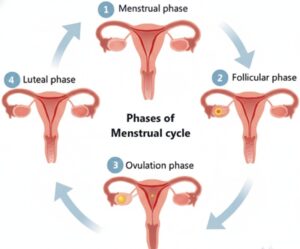Can I get pregnant if my periods are irregular? Guide

It is a common question for many women trying to conceive: Can I get pregnant if my periods are irregular? The short answer is yes, it is absolutely possible. However, it can present unique challenges.
Dr Aparna Gumma understands the complexities of irregular cycles and is dedicated to helping you navigate your path to motherhood.
While an inconsistent menstrual cycle might make it more difficult to predict your fertile window, it does not mean you have a fertility problem. The chances of conception can be improved with the right knowledge, professional medical guidance, and certain lifestyle modifications.
The link between irregular periods and pregnancy
Pregnancy is dependent on ovulation, which is the release of a mature, fertilisable egg. Consistent ovulation is often indicated by a regular menstrual cycle.
Therefore, irregular periods and pregnancy can be more difficult to align because the irregularity may signal that ovulation is not happening on a predictable schedule or, in some cases, not happening at all.
Irregular menstruation or difficulty getting pregnant with irregular periods is often linked to a condition called anovulation, where ovulation is absent or sporadic.
In fact, irregular or abnormal ovulation is responsible for a significant percentage of all infertility cases. The good news is that these issues can often be addressed and treated effectively.
What causes irregular periods?
Understanding the cause of your irregular periods is the first step toward finding a solution. Several factors can disrupt your menstrual cycle:
Stress: Elevated physical or emotional stress can disrupt the hormones responsible for regulating your cycle.
Weight fluctuations: A body weight that is either too high or too low can negatively impact your hormonal balance and ovulation.
Eating disorders: Conditions like anorexia nervosa can cause your periods to stop entirely.
Medical conditions: Common culprits for irregular cycles include Polycystic Ovary Syndrome (PCOS), thyroid disorders (like hypothyroidism or hyperthyroidism), and hyperprolactinemia.
How to get pregnant with irregular periods?
When your cycle is unpredictable, using a calendar-based approach to time intercourse is not reliable.
Instead, the focus should be on identifying your fertile window through more direct methods. Here are some fertility tips for irregular cycles:
Track ovulation: The most crucial step is learning when or if you are ovulating.
Ovulation predictor kits (OPKs): These tests detect a luteinising hormone (LH) surge just before ovulation. For irregular cycles, you should test more frequently.
Basal body temperature (BBT): Your BBT slightly rises after ovulation. Tracking it daily can confirm if and when you’ve ovulated.
Cervical mucus monitoring: Hormonal changes cause cervical mucus to take on a clear, slippery, and stretchy consistency, much like egg whites, as ovulation approaches.
Lifestyle adjustments: By maintaining a healthy lifestyle, you can have a positive influence on your cycle.
Moderate exercise: Regular physical activity can help manage weight and stress.
Balanced diet: A healthy diet can support hormonal balance.
Stress reduction: Techniques like yoga, meditation, or mindfulness can help regulate your body’s stress response.
Regular intercourse: Since your fertile window is unpredictable, having sex two to three times a week can ensure you don’t miss a potential ovulation day.
When to seek medical help?
While it’s possible to conceive naturally, a doctor’s guidance can be invaluable. You should consider booking a consultation with a fertility specialist if you:
- Have missed three or more periods.
- Have been trying to conceive for more than a year (or six months if you are over 35).
- Experience heavy bleeding or severe pain during your period.
- If you suspect a medical condition, such as PCOS or a thyroid issue, is the root cause.
A fertility doctor can complete an evaluation to determine the cause of your irregular cycles.
Treatments that may be recommended include ovulation-stimulating medications (such as clomiphene) or, when required, advanced procedures like intrauterine insemination (IUI) or in vitro fertilisation (IVF).
Begin your journey to parenthood
Don’t let irregular periods and pregnancy concerns hold you back. Dr Aparna Gumma is dedicated to helping you overcome these challenges by providing personalised care and a comprehensive approach.
Her team is dedicated to helping you achieve your dream of starting a family. Book a consultation today to develop a personalised plan and move forward on your fertility journey.
FAQ'S -
The most reliable way is to take a home pregnancy test. While you might experience early pregnancy signs like breast tenderness, fatigue, or nausea, these can also be symptoms of an upcoming period.
A pregnancy test is the best confirmation method because you don’t have a reliable date for your missed period.
Knowing the best time to test can be difficult if you have irregular periods. For the most accurate result, you should wait at least two weeks after your last unprotected sexual encounter. A good strategy is to take a test about three weeks after the last time you had intercourse.
Yes, you can. The challenge is that you don’t know when ovulation will occur.
By tracking your ovulation through methods like OPKs, BBT, and cervical mucus, you can identify your fertile window and time intercourse appropriately to increase your chances of getting pregnant while on your period.
Pregnancy is not determined by the number of days after your period. The timing of ovulation determines it. You can get pregnant in the days leading up to and including the day you ovulate. This is why tracking ovulation, not your period dates, is key.
Yes, it can be. The primary difficulty is that it’s harder to predict your fertile window, meaning you may not be timing intercourse correctly. Additionally, irregular periods can be a symptom of an underlying hormonal imbalance or condition that affects fertility.
It can. Irregular or absent ovulation, a key component of fertility, is frequently indicated by an irregular menstrual cycle. While not all women with irregular periods have fertility problems, the unpredictability can make conception more challenging.
The signs of early pregnancy with irregular periods are the same as with a regular cycle: Breast tenderness, fatigue, nausea, food aversions, and frequent urination.
However, because these symptoms can also be attributed to hormonal fluctuations or an impending period, the only definitive way to confirm pregnancy is with a positive pregnancy test.
Yes, you can. Many women with irregular periods do ovulate, just not on a predictable schedule. Ovulation can happen at any time during an irregular cycle, making ovulation tracking essential.
It is recommended to see a doctor if you are under 35 and have been trying to conceive for a year with irregular periods, or if you are over 35 and have been trying for six months. You should also seek medical advice if your periods stop for three or more months.
The most effective methods for tracking ovulation with irregular periods are those without a calendar.
This includes using ovulation predictor kits (OPKs), monitoring your basal body temperature (BBT), and observing changes in your cervical mucus. Combining these methods can give you the clearest picture of your fertile window.
About Dr Aparna
Dr Aparna Devi Gumma, female gynaecologist in Dubai, is one of the most trusted partners in women’s health with over 28 years of expertise as an Ob-Gyn and Advanced Gynecologic Laparoscopic Surgeon.
Related Blogs

4 Phases of the Menstrual Cycle and How They Affect Your Moods
4 Phases of the Menstrual Cycle and How They Affect Your Moods The menstrual cycle affects far more than reproduction, yet it’s often dismissed as “just a period.” Many women learn it happens once a month and may be uncomfortable, without understanding how deeply it influences energy, focus, mood, motivation,

Healthy pregnancy meal plan: Essential nutrition guide
Healthy pregnancy meal plan: Essential nutrition guide Nutrition plays a vital role in a safe and healthy pregnancy. A well-structured, healthy pregnancy meal plan helps ensure your baby’s development while keeping you energised throughout your pregnancy. Knowing which foods to eat during pregnancy supports better pregnancy outcomes and overall well-being.

Types of vaginal discharge: What do they mean?
Types of vaginal discharge: What do they mean? Vaginal discharge is a normal, healthy, and essential part of the female reproductive system. It’s the body’s natural way of cleaning and lubricating the vagina, protecting against infection. However, changes in its colour, consistency, or smell can often be the first sign

The Menopause Diet: 5-Day Plan to Lose Weight
The Menopause Diet: 5-Day Plan to Lose Weight For many women, the midlife years bring a frustrating mix of hot flashes, mood swings, and gradual weight gain around the middle. The 5 day menopause meal plan to lose weight is not a “quick fix” diet, but a structured way to
